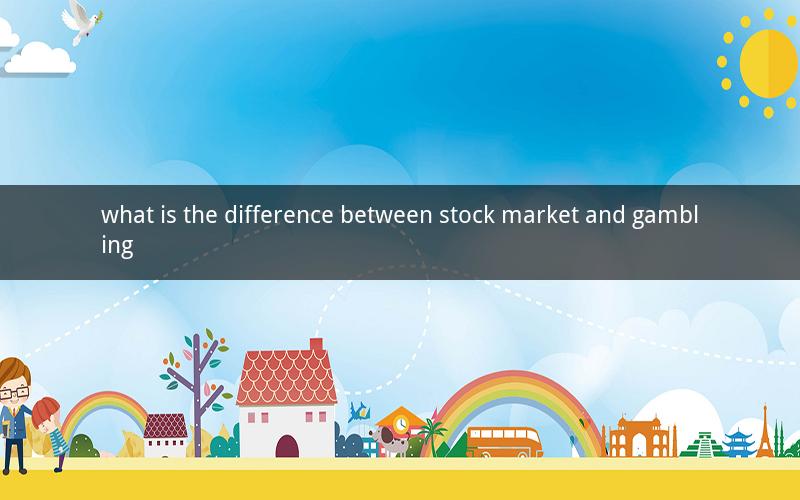
What is the Difference Between Stock Market and Gambling?
Table of Contents
1. Understanding the Stock Market
2. Understanding Gambling
3. Key Differences
- Risk and Reward
- Rules and Regulations
- Knowledge and Skill
- Long-term vs. Short-term
- Purpose and Motivation
4. Conclusion
1. Understanding the Stock Market
The stock market is a complex system where individuals, institutions, and governments buy and sell shares of publicly traded companies. It serves as a platform for capital allocation, allowing companies to raise funds for expansion and investors to own a portion of those companies. The stock market operates under a set of rules and regulations designed to ensure fair and transparent trading.
2. Understanding Gambling
Gambling, on the other hand, is an activity where individuals place bets on outcomes that are uncertain, with the primary goal of winning money or other prizes. It can take various forms, such as playing cards, dice, slot machines, or betting on sports events. Unlike the stock market, gambling does not involve ownership in any entity and is purely based on chance.
3. Key Differences
3.1 Risk and Reward
In the stock market, risk and reward are directly proportional. Investors who are willing to take on higher risks may achieve higher returns, but they also face the possibility of losing their entire investment. In gambling, the risk and reward are often not directly related to the amount of money wagered. For instance, a small bet on a slot machine can result in a large payout, while a large bet on a horse race may yield minimal returns.
3.2 Rules and Regulations
The stock market operates under strict regulations to ensure fair and ethical trading practices. These regulations are enforced by regulatory bodies such as the Securities and Exchange Commission (SEC) in the United States. In contrast, gambling is subject to various laws and regulations depending on the jurisdiction. While some forms of gambling are legal and regulated, others are illegal or unregulated.
3.3 Knowledge and Skill
Investing in the stock market requires a certain level of knowledge and skill. Investors must understand financial statements, market trends, and the fundamental analysis of companies. They must also be able to manage their portfolios and make informed decisions based on their risk tolerance and investment goals. In gambling, skill can play a role in some games, such as poker or blackjack, but luck often plays a more significant role.
3.4 Long-term vs. Short-term
Investing in the stock market is typically considered a long-term endeavor. Investors often hold their shares for years, if not decades, to benefit from the growth and dividends of the companies they own. Gambling, on the other hand, is often viewed as a short-term activity, with players seeking quick wins or losses.
3.5 Purpose and Motivation
The primary purpose of the stock market is to allocate capital and provide a means for companies to grow and innovate. Investors participate in the stock market with the goal of achieving financial returns and building wealth over time. In gambling, the purpose is often to win money quickly, with the motivation being entertainment or the thrill of taking risks.
4. Conclusion
In conclusion, the stock market and gambling are fundamentally different activities. The stock market is a regulated system designed to allocate capital and provide investment opportunities, while gambling is an activity based on chance and often involves a higher level of risk. Understanding these differences can help individuals make informed decisions about where to allocate their resources and time.
---
Questions and Answers
1. Q: Can a person make a living from the stock market?
A: Yes, some individuals have made a living from the stock market by investing strategically and managing their portfolios effectively.
2. Q: Is it possible to lose money in the stock market?
A: Absolutely, investing in the stock market carries the risk of losing money, although historically, the market has shown a tendency to increase in value over the long term.
3. Q: Can one predict the stock market's movements?
A: While some investors may claim to predict market movements, the stock market is influenced by numerous unpredictable factors, making accurate predictions challenging.
4. Q: Is gambling addictive?
A: Yes, gambling can be addictive, as it triggers the release of dopamine in the brain, which can lead to compulsive behavior.
5. Q: Are there any strategies to win at gambling?
A: Some strategies can improve one's chances of winning in certain games, but luck often plays a significant role, and there is no guaranteed method to win consistently.
6. Q: Can gambling be considered a form of investment?
A: No, gambling is not considered a form of investment as it does not involve ownership in any entity and does not contribute to the growth or development of companies.
7. Q: Are there any similarities between the stock market and gambling?
A: Both involve risk and the potential for financial gain, but the methods, goals, and underlying principles differ significantly.
8. Q: Can one learn to invest like a professional?
A: Yes, individuals can learn to invest like professionals by studying financial markets, understanding investment strategies, and gaining practical experience.
9. Q: Is it illegal to gamble online?
A: The legality of online gambling varies by jurisdiction, with some countries allowing it, while others prohibit or restrict it.
10. Q: Can investing in the stock market be considered a form of entertainment?
A: While some investors may find the stock market entertaining, its primary purpose is to provide financial returns and contribute to economic growth.